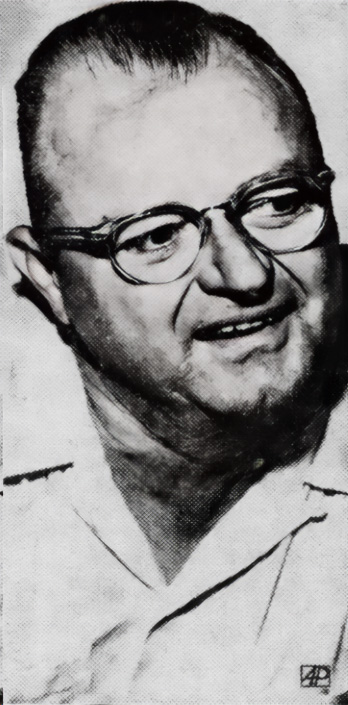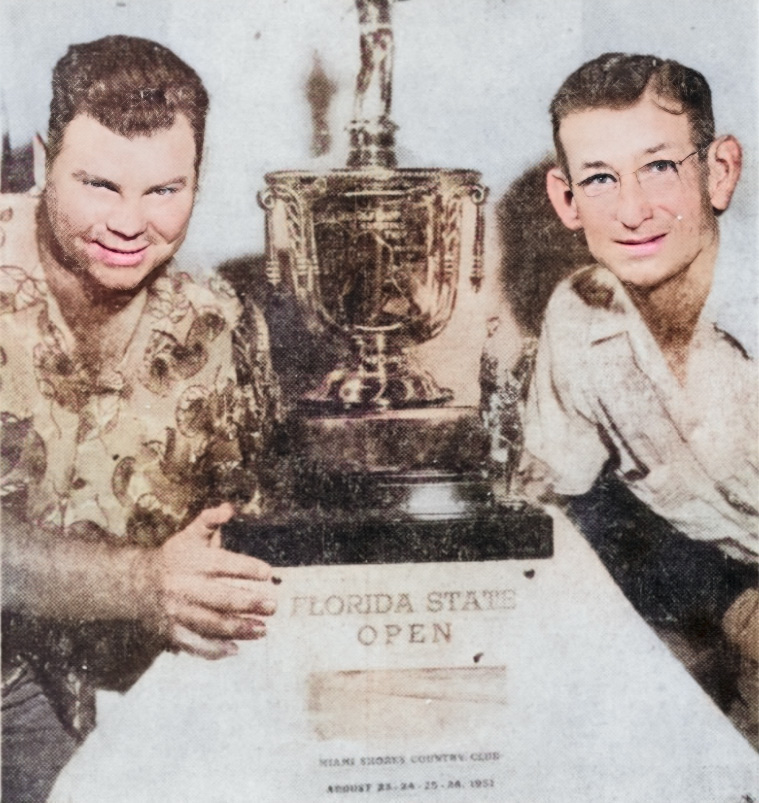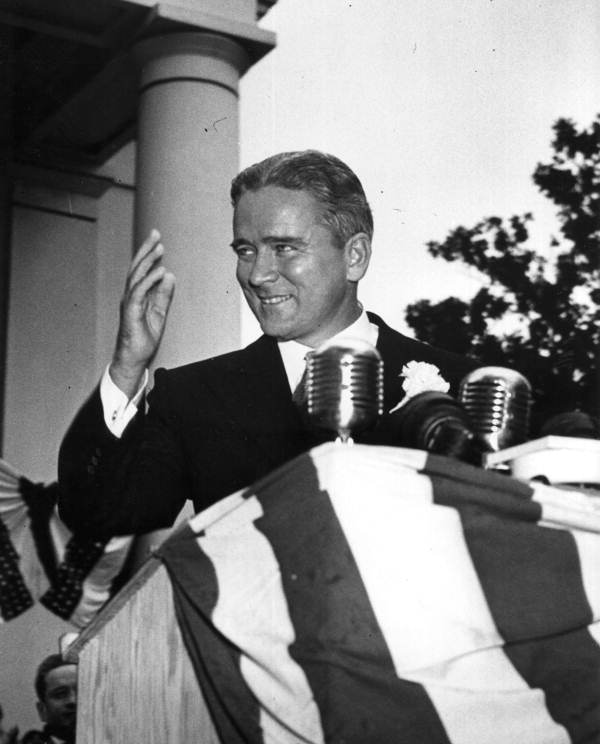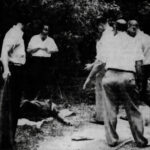In Central Florida, the Cuban lottery (bolita) transcended class and culture during the 1940s and 1950s. It was controlled by crime family bosses in Tampa and Orlando, with a cascade of regional underbosses and local game makers in every community. You could place bets virtually everywhere: corner stores, pool halls, barber shops, and fraternal organizations.
But I keep asking myself one question: Who were the real bolita bosses? Were they the crime families or the law enforcement officials? As we’ll find out in this article, sheriffs imposed royalties on illegal gambling and gave orders to crime bosses!
We’ll focus on Frank M. Williams of Polk County, but understand that he is just one example of similar circumstances in many counties across Florida!

Making of a Sheriff
Frank served in the Lakeland Police Department before unsuccessfully running for county sheriff in 1940 against Dewitt Sinclair. Following the election, he worked as a security guard at the new Lakeland plant of Food Machinery Corp. Despite the name, FMC produced tanks during World War II–but that’s a story for another day!
Every candidate in the 1940 election promised to crack down on gambling and alcohol rings (Polk was a dry county at the time). However, the odd thing about Sheriff Sinclair is that he kept his campaign promises! And the local bosses hated him for it.
Emmett Caraker was one such bolita king. He ran the “phosphate district” in the county’s western half, with his headquarters in Mulberry. Caraker was a noted golf pro who was blusteringly arrogant about his untouchability. “It would take a magician to catch me,” he boasted. He readily admitted his line of work but kept himself insulated from the dirty work.
Williams and Caraker were acquaintances for many years. In May of 1947, Caraker summoned Williams for a meeting in a back room at the post office in Tampa. The mobster proposed that Williams (then a court bailiff) run again for county sheriff. Williams said he didn’t have the money for a campaign, but Caraker assured him that funding would not be a problem–as long as they could agree upon bolita enforcement.
The two met several more times in Tampa. On a later visit, Caraker brought along Rhodes Boynton, the Orlando boss controlling the eastern part of Polk County. The offer was cut and dry. They would deliver the election to Williams in exchange for an unmolested monopoly in their respective territories. In other words, Williams would crack down on their competition while leaving them to operate freely. Williams agreed to the terms, and the support began to flow.
Caraker and Boynton contributed around $20,000 to his campaign, around $285K in 2024 dollars. Between their financing and influence, Frank M. Williams won the fall run-off election against the incumbent Sheriff Sinclair.

No Honor Among Thieves
The funny thing is—unlike his predecessor—Williams did not keep his promises. Little did Boynton and Caraker know, but Williams also met with Jerry Roundtree before the 1948 run-off election. Roundtree was a minor boss who sought to increase his business. The two met at a pool hall in Eloise (a small town near Cypress Gardens). Roundtree threw in a $600 campaign contribution with the understanding that he could operate in the bolita business around Winter Haven.
Williams made similar deals with Cecil McKown, Henry Barnhill, and Connie Summers for parcels of territory around Winter Haven and Auburndale. S. A. “Little Rabbit” Holland, George Mixon, and Lewis Allen chipped in with the understanding they’d be allowed to operate around Bartow.
This was the first of many times Williams would change the terms of the deal.

A New Sheriff in Town
Sheriff Williams took the oath of office in January 1949. In his first few months in office, he was indeed easy on the bolita kings and booze runners. However, it wasn’t long before Williams decided their previous contributions were insufficient. He needed a cut of the action.
As the sheriff, he knew not to openly visit with these shady operators. Instead, he had several go-betweens: Paul Jennings (his chief deputy) and Fern Roquemore. Conveniently, the sheriff’s attorney (hired with county money), Manuel Glover, was also on retainer with Caraker and Boynton. He regularly conveyed messages and money between the two, veiled behind client-attorney privilege.
The two regional kingpins, who amicably split the county in half, were understandably unhappy about the sheriff’s demands. However, initially, it was modest surcharge and far cheaper than shutting down their operations. So, they went along with it.
Two months later, Deputy Jennings visited Caraker at his mansion in Mulberry to deliver a message: the sheriff’s commission increased to 5% of their gross bets. Caraker rebuffed the hike. The deputy warned him, “You better get right or go see the man (Sheriff Williams).” After that, Jennings randomly ordered them to stop taking bets certain weeks when things “got too hot.” According to Caraker’s later court testimony, Williams shut their business “off and on like water.”
Deputy Jennings insisted they needed the extra percentage to send a cut to Tallahassee (no evidence ever surfaced this was true). Caraker held out for a while, but after his loyal customers began heading to Tampa to place bets, he accepted the price hike with some conditions.
Boynton worked with Caraker to broker a deal: the sheriff allowed them to expand into bootleg liquor and additional lottery offerings. Previously, they sold bets on numbers for the weekly Cuban lottery. They began a “night house” version where the numbers were locally selected nightly. The gamblers liked it for the small buy-ins and more frequent action; the lottery sellers liked it because they could manipulate the numbers!
Besides that, the local kingpins found a way to avoid squeezing their own profits. Typically, the “bugs” in the field taking orders and the “bankers” extending the financing took a 15% cut. Their commission was reduced to 10% to make room for the sheriff!
For his part, Williams was living large. He collectively received up to $3,000 per month (in 1950, $3,000 was a reasonable annual salary). The sheriff purchased a new Buick Roadster with a radio. That may not sound elegant now, but for 1950, it was a swanky ride! The go-betweens Jennings and Roquemore got relatively minor cuts of a few hundred dollars. Attorney Glover, meanwhile, shrewdly received thousands (in the form of legal retainer fees) from both sides!
New Orlando Boss Takes Over
Rhodes Boynton, the Orlando boss controlling eastern Polk County, died of natural causes in November 1949. Natural causes? Hard to say how natural it is when a 44-year-old dies, but it was reportedly from a heart ailment. These wise guys had far more efficient ways to assassinate folks. So maybe it was natural… who knows?
Regardless, Ed Milam took over for him. Milam took over the Central Florida business, headquartered at Boynton’s Flamingo Club lounge in Orlando.
Milam was no stranger to Polk County. He cut his teeth in helping Boynton run the Paramount Club off US 92 in the 1930s. It was the hub of gambling and other illicit activities between Lakeland and Plant City. Milam was suspected of the murder of payment runner Henry Hull in 1939, but the charges never stuck. However, in 1946, he was convicted of the attempted bribery of a Sheriff Dewitt deputy. Milam received a $3,000 fine and a harsh ten years of probation. He left Lakeland for Orlando.
In 1950, Milam grew his influence to control Caraker and others. He effectively ran most of Polk, Orange, Osceola, Seminole, Lake, and Volusia counties via underbosses. The new Orlando king paid commissions on Polk County revenue to Sheriff Williams on Caraker’s behalf through their shared attorney, Manuel Glover. Flexing his substantial regional leverage, Milam met with the sheriff face-to-face at a Lakeland hotel in February. He negotiated a rate reduction from 5% of the gross revenue to a flat $1,000 monthly, covering the northeastern section around Haines City and Caraker’s western “Bone Valley” region.
Separately, the sheriff permitted several minor rings in the outlying towns. He received weekly payments from Cecil McKown ($200), Connie Summers ($100), T. A. Rountree ($100), and several unnamed others.

Down Comes the Hammer
In the spring of 1950, newspapers made lots of noise about the abundance of illegal gambling and liquor statewide. Governor Fuller Warren could no longer ignore it. While we focus on Polk County here, neighboring sheriffs in Hillsborough and Polk were said to have agreements with crime families.
The governor asked every sheriff to make a report on the state of gambling in their county. A week later, Sheriff Williams reported that, after a thorough search throughout the county, his deputies found no evidence of bolita. Hah!
A couple of months later, Deputy J. B. Stanley took it upon himself to fulfill his lawful duties. He arrested Jerry Roundtree (one of William’s blessed operators) for conducting a lottery and possession of lottery paraphenalia. Williams was incensed! Two weeks later, the sheriff forced the deputy’s resignation.
The heat continued to mount, and the sheriff began to point fingers. He blamed the county attorney, Gunter Stephenson, for failing to prosecute the bolita cases. The feud culminated in a shouting match at a Kiwanis Club meeting in Lakeland. To assert his innocence, Stephenson begged the governor to investigate the county thoroughly.
After weeks of investigation and surveillance, state attorney Walter Woolfork organized a raid on the home of Winter Haven boss Cecil McKown. Stephenson was integral to the operation; Sheriff Williams had no idea it was happening!
A bevy of evidence surfaced, leading to a volley of charges in August 1950. The bolita operators and Chief Deputy Jennings were given immunity or leniency in exchange for their testimony against the sheriff. The grand jury indicted Sheriff Williams in September, and Governor Warren relieved him of his duties the following day.
The trial opened on February 19, 1951, and the sheriff never had a shot. There was a mountain of evidence and testimony from a dozen cooperating witnesses. Caraker, Millam, Jennings, and many others took the stand against the sheriff. They outlined every detail and a timeline of years of conspiracy, bribery, and malfeasance. Other witnesses painted Williams as a drunk, often being virtually incapacitated while on duty. The sheriff even knowingly allowed an officer to sexually assault female prisoners over the course of weeks.
He wasn’t a good dude. Thankfully, the former sheriff was found guilty and removed from office. Hagan Parrish, former Chief Deputy of Sheriff Sinclair, was appointed to replace him.
Fern Roquemore and attorney Manuel Glover were also convicted. Both were fined $500, and Glover had his attorney license revoked by the Bar.
What Happened Next?
Roll credits! Think of this as one of those movie end-scenes, where we summarize what happened in the coming years to our key actors:
- Get this! Williams had the audacity to run for re-election in 1953. Luckily, the Polk County voters thought better of that idea; he finished a distant third.
- Six years later, the Florida Supreme Court reinstated Manuel Glover’s license to practice law, expressing confidence in his rehabilitation.
- Caraker persisted in running bolita operations despite legal consequences. In 1952, he was arrested for driving under the influence and resisting arrest. He tried to bribe two arresting officers to evade charges, but they declined. Consequently, he faced charges, was convicted on multiple counts (including gambling operations), and was subsequently incarcerated in Raiford State Prison.
- Governor Fuller’s crackdown came only after mounting political pressure. In 1948, he was accused of taking campaign funds from gambling outfits and being soft on enforcement. In 1952, the State House attempted to impeach him, but the measure failed.
- Cecil McKown moved to Wauchula. He was sentenced to two years in prison in 1953 for bootlegging liquor.
- Ed Milam’s bullet-riddled body was found in a swamp south of Kissimmee in 1953. Harlan Blackburn took over as the new Orlando kingpin but was never a suspect in the murder. Blackburn-controlled local bosses operated in Polk County for the next three decades, with limited interference from law enforcement.
Sources
- Newspapers.com archives of Tampa Tribune, Orlando Sentinel, Tampa Bay Times, and Bradenton Herald.
- Sunshine State Mafia, book by Doug Kelly (2024)
- Wikipedia
Previous article in series: Florida Lottery Has Origins in Cuban Bolita






2 responses to “Polk County Sheriff ousted in gambling crackdown”
[…] Next article: Sheriff Williams of Polk County was bought and paid for by the mob […]
[…] all came to light in 1951, when Milam fessed up as a star witness against new Polk County Sheriff Frank Williams. Milam’s testimony helped convict the sheriff, but it did nothing to convince the state to […]